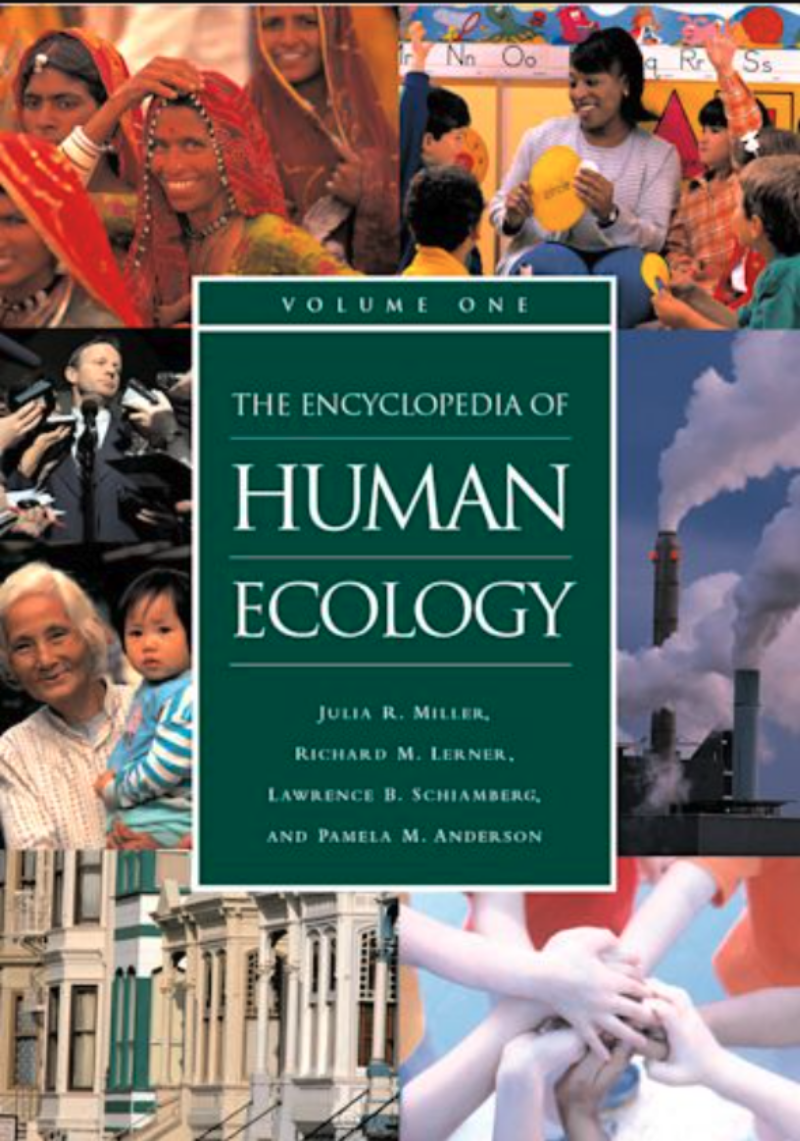Citation
King, P.E. (2003). Social capital. In J. R. Miller, R. M. Lerner, L. B. Schiamberg, & P. M. Anderson (Eds.), The Encyclopedia of Human Ecology. Santa Barbara, CA: ABC-Clio.
Abstract
The first—and only—source to integrate the multiple disciplines and professions exploring the many ways people interact with the natural and designed environments in which we live.
Comprising more than 250 informative entries, The Encyclopedia of Human Ecology examines the interdisciplinary and complex topic of human ecology. Knowledge gathered from disciplines that study individuals and groups is blended with information about the environment from the fields of family science, geography, anthropology, urban planning, and environmental science. At the same time, professions intended to enhance individual and family life—marriage and family therapy, clinical psychology, social work, dietetic and other health professions—are represented alongside those concerned with the preservation, conservation, and management of the environment and its resources.
How rampant are eating disorders among our youth? Are AIDS educational programs effective? What problems do adolescents transitioning into adulthood encounter? Here, four leading scholars in the field have assembled a team of top-tier psychologists, sociologists, anthropologists, and other experts to explore these and hundreds of other timely issues.
Copyright
Year: 2003
Holder: Bloomsbury Publishing
DOI: https://www.bloomsbury.com/au/encyclopedia-of-human-ecology-9781576078532/
Continue Exploring

Christian
On Being and Becoming Human Through Accompaniment and Telos
Sage Journals Journal of Psychology and Theology Volume 53, Issue 1, March 2025, pp. 85-107 On Being and Becoming Human Through Accompaniment and Telos: Ontological Convergences Between Christian Anthropology and the Science of Human Development Abstract We discuss several points of convergence in ontological concepts within Christian anthropology and the contemporary dynamic, relational, developmental systems (RDS)-based approach within developmental science. Both approaches uphold the significance of relationality, particularly of mutually beneficial (nurturing) relationships between every individual and others, as both the means and the ends of human development and thriving. Both magisteriums build similarly on the fundamental significance…

Mindfulness
Theological Perspectives on Beliefs and Communities of Practice
Book: The Routledge International Handbook of Multidisciplinary Perspectives on Character Development, Volume I Conceptualizing and Defining Character Chapter 18 (34 pages) Theological Perspectives on Beliefs and Communities of Practice Virtue Systems as an Integrative Approach for Psychologists Abstract In order to offer a theological perspective of virtue development, we treat virtues as habitus, moral habits that are cultivated in local communities with transcendent belief narratives. Virtues are dependent on traditions to inform their purpose or telos and to give definition to the good life. Although psychology offers a conceptualization of virtues focused on the self-system—including characteristic adaptations and…

Youth
“We are Protected”: Examining youth perceptions of safety
“We are Protected”: Examining youth perceptions of safety within a faith-based positive a faith-based positive youth development program in El Salvador / Journal of Youth Development

